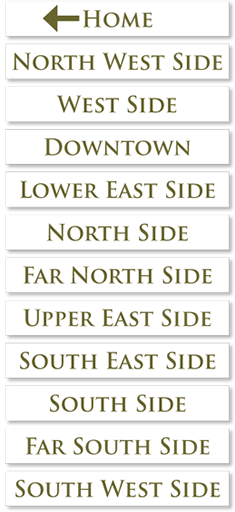|
Jill Florence Lackey
“I’ve noticed the ways that telling the story of each
little neighborhood, one-by-one, ends up telling the story
of Milwaukee as a whole, and all the eras that
Milwaukeeans lived through. It is constantly a narrative
about new populations emigrating or migrating in, their
experiences, and what they added and continue to add to
the overall appeal of the city. But what sickens me is
having a glimpse of the Milwaukee that could have been,
save for those decades of urban renewal and freeway
building that broke through the center of ethnic life,
tossing communities and local main streets to the wind.
There was hardly a neighborhood in the city that didn’t
experience some effects from the displacements, and we
have yet to interview a resident that thought these
changes made this a better city.”
Sienna Jacks
“Working on these studies we had such a chance to compare.
Some neighborhoods are perfect for one kind of resident
and others for another kind of resident.
- A family with children would find a
perfect home in Lincoln Village or Baran
Park because of access to a plethora of
parks, kids’ programs galore, sports leagues, and a
massive community center. King Park is
another possibility.
- People looking for an old-fashioned,
cohesive neighborhood could select Pigsville.
- If your love is architecture, you’d
want to live in Northpoint.
- If you need to feel the old Socialist
presence, Garden Homes is your
neighborhood.
- If you want a gorgeous home for the
price of a cottage, go to one of the Sherman
Park neighborhoods or Brewers Hill.
- If you want to be part of a new,
developing community go to Beerline B or Harambee (site
of new Bronzeville).
- If you want to live in the country
while being a Milwaukee resident, go to North
Granville.
- If gardening is your absolute love
and you might want to sell some of your produce, any of
the Garden Districtneighborhoods will
work for you.
- If you like night life, you would be
at home in Bay View or the Third
Ward or Brady Street.
- If art is your thing you might want
to look into Riverwest or Walker’s
Point.
- If you like elegant living in
historic houses, you should be happy with Yankee
Hill or Historic Concordia.
- If you want a place where residents
really take charge of their neighborhood you might be
happy in Triangle (Lindsay Heights) or Merrill
Park or Martin Drive.
I could go on and on.”
Rick Petrie
"Working on this website has given me an
opportunity to explore many neighborhoods that I was not
familiar with at all. I’m impressed with all the assets
and resources our neighborhoods have to offer.
While it’s easy to be impressed by the magnificent
structures and beautiful houses we can find in many
neighborhoods, there are other assets that are sometimes
overlooked. You can find beautiful little pocket parks
such as the Ezekiel Gillespie Park in the North Division
neighborhood and small community gardens in many other
areas that are creating community spaces in formerly empty
lots.
Finding and documenting these assets has been a very
gratifying experience."
Chrissy Haikel
“I've really enjoyed getting to work on
the neighborhoods project. Being a Milwaukee outsider, I
went into it knowing very little about the Walker's Point
neighborhood. After collecting oral histories, I feel like
I've gotten to know the ins and outs of this one
particular place. Residents I interviewed often referenced
many of the same important neighborhood features, events,
and people, with each adding their own perspective and
creating a more whole picture of the neighborhood. It's
such a treat to have residents share their personal
stories with you!”
Rebecca Fetzer
"My very first experience conducting
ethnographic fieldwork as an anthropologist was with Urban
Anthropology Inc. The opportunity to work with a plethora
of ethnic groups in Milwaukee was genuinely rewarding
because of the wealth of information people were willing
to share and the ability of the anthropologist to then
give back to the community by educating others about these
unique ethnic histories. One group in particular that I
interviewed was the Kashubes during their annual picnic at
Kaszube’s Park on Jones Island. They were an incredibly
welcoming and lively group who were eager to answer my
questions. Here, I was able to observe the dedication of
the descendants of former settlers to preserve a part of
their heritage through music, food and personal stories
about their family histories as well as how they carry on
their traditions today. These individualized and highly
personal stories contain information that one cannot find
in a general history book, but are instead collected in an
anthropologist’s notebook. These are the stories of
Milwaukee’s past that need to be heard by all to truly
appreciate the city’s extraordinary diversity."
|

